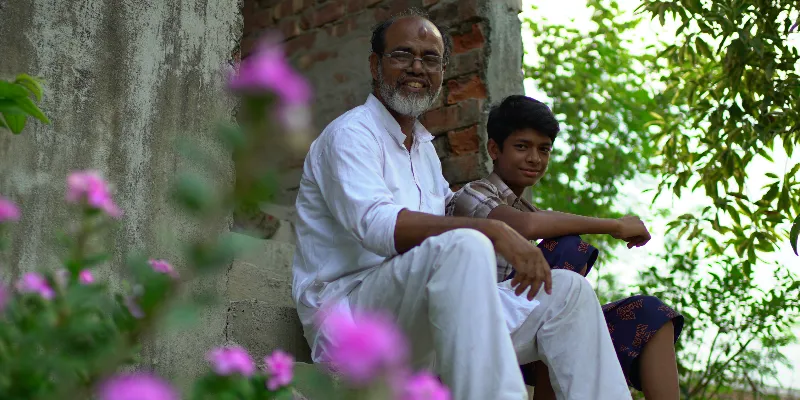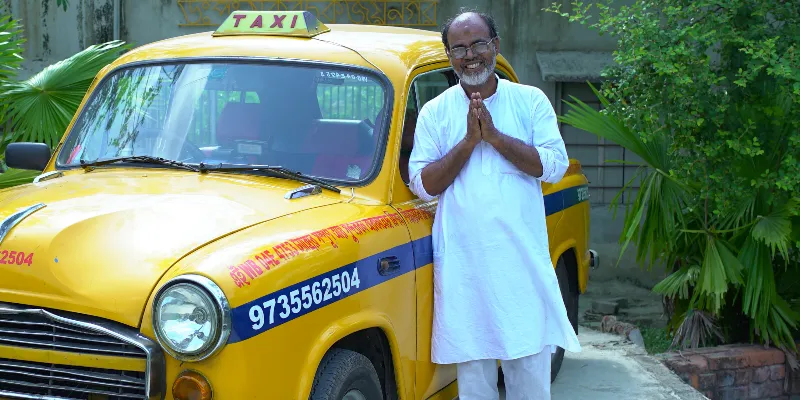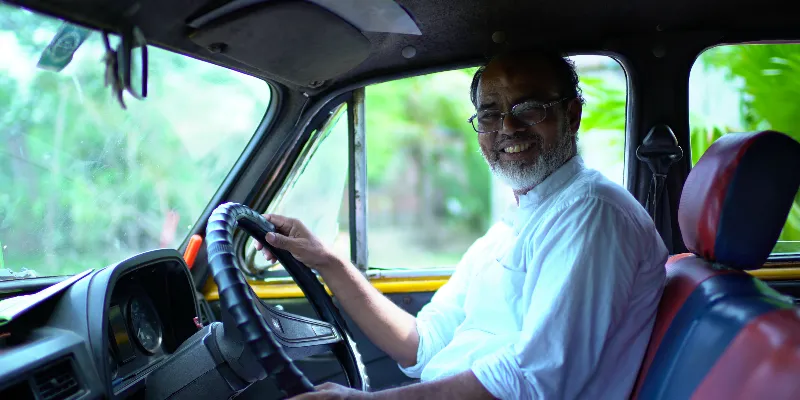From begging on streets to educating over 500 children for free: the story of Gazi Jallaluddin
One day, at the age of seven, Gazi Jallaluddin thought he was having the best day of his life.
Skipping all the way home, with a heart about to explode with joy, he bursts into the door to break the news to his family that he had topped his class in school.
But, the world beyond that door had a starkly different vibe; his family was living in a grim parallel reality.
“My father had no money, and told me that I will have to leave school,” recounts Gazi.
This moment, however, marked the beginning of one of the most remarkable stories of heartland heroism to have unfolded.

The backdrop
The financial difficulties of Gazi’s family were severe enough to first render them unable to put food on the table, and eventually, keep the roof over their heads. “We left our village in the Sundarbans and went to the Maulana area in Kolkata. We used to sleep on the footpath and beg on the streets,” says Gazi.
While they continued living on the footpath, his father passed away, and his mother took the decision to return to their village in the Sundarbans. Meanwhile, Gazi, left to fend for himself, was compelled to start working early in life—he started driving a tanga rickshaw (a hand-pulled cart) in the local market at the heartbreakingly young age of 12. He continued doing so for almost five years until he was 17 or 18, at which point he also got married.
Even as life was moving forward somehow, Gazi’s mind and heart had never really left that classroom back in his village, the one that—so tragically—got away. “I never stopped hurting about not being able to continue my education- and wondered how many others meet the same fate every day. I decided that if I was ever blessed with prosperity, I’d never let any child miss out on education,” he states.
This doubled up as his sole drive to earn more money. So, while driving a tanga rickshaw, he requested a friend he had made in the city, Mohammad Sami, who hailed from Allahabad and was a taxi driver, to teach him how to drive. Around the year 1979, he officially started driving a taxi, when he was about 19 years old.

But, troubled by the thoughts of children succumbing to abject poverty and unable to wait any longer to start turning their lives around, he immediately formed a committee back in the Sundarbans. He named it “Sunderban driving committee,” and identified about 10 underprivileged young boys as members. “I told them I will teach them how to drive and get them jobs, and in turn, they must pledge five rupees from their salaries every month, and furthermore teach and educate two more kids, who will also become members and educate two more. The donations collected will be given to any child who does not have the means to join school,” he explains.
The power of compassion
This model was wildly successful—the committee grew from 10 to 20, 20 to 40, and so on, until around 500 people were brought into the network, all of whom took up driving professionally.
“My entire village now consists of people who drive taxis, tangas, rickshaws, big cars, and small cars!” Gazi muses.
The next step was to provide clothes, uniforms and books for children with the money collected. When it started falling short, Gazi spoke to the passengers in his taxi daily for donations too, and continued year after year with the contributions made by the Good Samaritans.
When he saw how effective this model was, Gazi dared to dream bigger and opened a school next. “I began asking the people of my village to provide me with some piece of land where I could open a school, but they all refused. So, I just continued driving and with that income, sent my own two kids to school and in 1998, built a two room-home. I stayed in one with my family, and the other I transformed into a school—the Ismail Israfil Free Primary School, named after my two sons,” he says. The school has also been registered in their names.
Year after year, donations kept coming in for the children’s stationery, uniforms and meals, and even for the salaries of the teachers, and the school expanded classes up to the fourth grade.
When everything conspired to make his dream come true
After some time, one day in his taxi, he chanced upon the information that a man with four brothers was looking to sell off their property. Gazi approached them and got one part of the entire property belonging to all the brothers—it was almost five times the size of his house. He built the school on this land and wished to extend it even further, as the response to his work for the community was immensely positive.
After getting many doors slammed in his face, he finally came across someone who was ready to buy the land for his dream—a gentleman from Calcutta who identified the property and sanctioned the construction of the school. Once the construction was completed in 2009, Gazi inaugurated the school and employed four teachers. Later, that number turned to eight. He admitted a total of 100 children that turned to 200 by 2012.

At this point, both schools together house 400 children. He says,
“There is nothing in it for me, I have no self-interest in this endeavour. I am happy with whatever little I have. I’d like to thank all those people out there who are constantly donating to us, sometimes they donate cement, sometimes brick.”
In 2011, he bought some more land, and is in the process of finishing the construction of his third building, for which he needs a helping hand. “Sundarbans has some of the most unfortunate families and people who do not own clothes, or have food. If we keep working like this, maybe in 15 years or so, the condition will improve,” he says.
Before Gazi repopulated the educational ecosystem there, the nearest government school was about two to three miles away—with questionable quality of education, no less. “The school that I’ve built is very close to my heart. The other school has a few shortcomings, mine is still larger and fully functional,” he says.
You can be a part of this iconic story
Gazi is now 65 years old, has had both his eyes operated on, but still drives a little to keep the donations flowing in.
His youngest, also a taxi driver, earns about Rs 400 daily, out of which Rs 200 is donated to fuel the advancement of the school. Besides his third school, he is also building an orphanage, for which he needs Rs 2 lakh to address the major water supply problem and for the repair work of the treacherous roads in Sunderbans.
Gazi says he still has a few more dreams to fulfill—he wants to see the day when one of his students becomes a successful collector, barrister, or engineer. “I would like the student to help other unfortunate people out. This is my dream. Apart from this, I want to teach people to drive, or to run a computer centre, etc. And someday, start an institution where students can study up to graduation,” he says.
Later this month, Merck's Neurobion Forte will be presenting him an award for his heroism, and you can also contribute to his success story by donating towards his cause:
Name – Sundarban Orphanage And Social Welfare Trust,
Account Number – 1096011062636
Bank Name – United Bank Of India
Branch – Mayukh Bhavan, Salt Lake, Kolkata- 700091
IFSC Code – UtbIOMBHD62
Branch code – MBHD62







